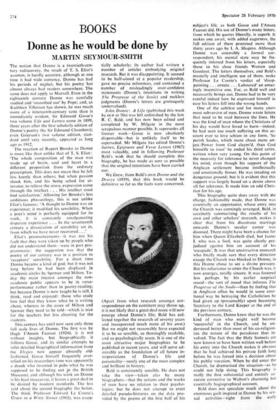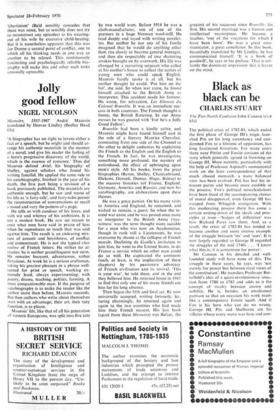BOOKS Donne as he would be done by
MARTIN SEYMOUR-SMITH
The notion that Donne is a twentieth-cen- tury rediscovery, the result of T. S. Eliot's acumen, is hardly accurate, although at one time it had wide currency. Donne has had
his periods of neglect, but his poetry has almost always had readers somewhere. The same does not apply to Marvell. Even in the eighteenth century Donne was carefully studied and 'smoothed out' by Pope; and, as Kathleen Tillotson has shown, he was much more of a nineteenth-century taste than is immediately evident. Sir Edmund Gosse's two volume Life and Letters came in 1899, three years after the first scholarly edition of Donne's poetry (by Sir Edmund Chambers); even Grierson's two volume edition, stan- dard until very recently, appeared as long ago as 1912.
The reaction of Rupert Brooke to Donne is more like than unlike that of T. S. Eliot: 'The whole composition of the man was made up of brain, soul and heart in a different proportion from the ordinary prescription. This does not mean that he felt less keenly than others; but when passion shook him, and his being ached for ut- terance, to relieve the stress, expression came through the intellect . . . His intellect must find satisfaction.' Allowing for Brooke's less ambitious phraseOlogy, this is not unlike Eliot's famous: 'A thought to Donne was an experience; it modified his sensibility. When a poet's mind is perfectly equipped for its work, it is constantly amalgamating disparate experience . . . In the seventeenth century a dissociation of sensibility set in, from which we have never recovered ...'
Eliot's pronouncements—it was not his fault that they were taken up by people who did not understand them—were in part pro- grammatic: the suggestion was that the poetry of our century was in a position to `recapture' sensibility. For a short time Donne became a kind of god; but it was not long before he had been displaced in academic circles by Spenser and Milton. To- day the main interest amongst the non- academic public appears to be in verse- performance rather than in poetry-reading; but because Donne is now taught he is still, I think, read and enjoyed : those who study him feel that they know what he is writing about, whereas in the cases of Milton and Spenser they need to be told—which is nice for the teachers but less cheering for the students.
This century has until now seen only three full scale lives of Donne. The first was by Hugh I'Anson Fausset (1924); it is not without insights, but biographically . it follows Gosse, and its similar attempts to infer detailed biographical information from the Elegies now appear absurdly old, fashioned. Gosse himself frequently over- relied on his researchers (one was apparently a drunk who invented in pubs what he was supposed to be finding out in the British Museum), and although his work on Donne is his least inaccurate, it leaves a great deal to be desired by modern standards. The less said about the second biography the better. The third, Professor Edward Le Comte's Grace to a Witty Sinner (1965), was essen- tially scholarly; its author had written a number of articles embodying original research. But it was disappointing. It seemed to be half-aimed at a popular readership, gave no precise references, and contained a number of misleadingly over-confident statements (Donne's intentions in writing The Progresse of the Soule) and reckless judgments (Donne's letters are grotesquely undervalued).
John Donne: A Life (published this week by oue at 70s) was left unfinished by the late R. C. Bald, and has now been edited and completed by W. Milgate in the most scrupulous manner possible. It supersedes all former work—Gosse is now absolutely dispensable—but is unlikely itself to be superseded. Mr Milgate has edited Donne's Satires, Epigrams and Verse Letters (1967) most valuably, and in following Professor Bald's wish that he should complete this biography, he has made as sure as possible that the original intentions have been carried out.
We knew, from Bald's own Donne and the Drurys (1959), that this book would be definitive so far as the facts were concerned.
(Apart from what research amongst cor- respondence on the continent may throw up, it is not likely that a great deal more will now emerge about Donne's life; Bald has col- lected together the research of seventy years and incorporated much more of his own.) But we might not reasonably have expected it to be so sensible, so thoroughly readable, and so psychologically acute. It is one of the most attractive major biographies to be published in recent years, and will serve ad- mirably as the foundation of all future in- terpretations of Donne's life and personality—surely one of the most complex and brilliant in history.
Bald is consistently sensible. He does not take the view—taken alas by many biographers—that the actions and the works of men have no relation to their psycho'. logies; but he does not attempt to erect detailed pseudo-histories on the data pro- vided by the poems of the first half of his subject's life, as both Gosse and I'Anson Fausset did. His use of Donne's many letters, from which he quotes liberally, is superb. It makes one await, with added eagerness, the full edition of them promised more than thirty years ago by I. A. Shapiro. Although Donne was ostensibly a formal cor- respondent, his mental state may be fre- quently inferred from his letters, especially those to his close friends Wotton and Goodyer. The letters themselves, and Bald's masterly and intelligent use of them, make Professor Le Comte's verdict of 'disap- pointing . . . ornate .. . Laboured' an amaz- ingly insensitive one. For, as Bald well and necessarily brings out, Donne had to be very careful indeed how he expressed himself in case his letters fell into the wrong hands.
One of the subtlest and for many years most subversive of men, Donne wrote letters that need to be read between the lines. He was the kind of man whom the Christians of his day would have loved to burn—indeed, he had seen too much suffering on this ac- count ever to love schism in any form. 'So perish Soules, which more chuse mens un- just/Power from God claym'd, than God himselfe to trust' he ended his third satire, written when very young. On this point of the necessity for tolerance he never changed his mind, even though his support of the Anglican settlement became intellectually and emotionally firmer. He was treading on dangerous ground; but it is evident that this support was largely based on a desire above all for tolerance. It made him an odd Chris- tian for his age.
This biography quite does away with the charge, fashionably made, that Donne was essentially an opportunist, whose entry into the Church was cunningly arranged. Bald, in succinctly summarising the results of his own and other scholars' research, makes it clear that from his disastrous marriage onwards Donne's secular career was doomed. There might have been a chance for him when Queen Elizabeth died, but James I, who was a fool, was quite clearly pre- judiced against him on account of his 'escapade'. It was that unattractive monarch who finally made sure that every direction except the Church was blocked to Donne; in this Donne chose to see a divine pressure. But his reluctance to enter the Church was, it now emerges, totally sincere. It was fostered less perhaps by his earlier sceptical mood—the sort of mood that informs The Progresse of the Soule—than by feeling that in Anglican office he would in some emo- tional way be betraying the Catholicism he had given up (presumably) upon becoming Secretary to the Lord Keeper at the end of the previous century.
Furthermore, Donne knew that he was the kind of man who might well become 'successful' in the Church, and he un- derstood better than most of his co-religion- ists the nature of the paradoxes thus in- volved. The fact that the Holy Sonnets are now known to have been written well before his entry into the Church makes it obvious that he had achieved his private faith long before he was forced into a decision about his public vocation. When he did enter the Church, he dramatised the situation—as he could not help doing. This biography is really the first substantial and entirely ac- curate corrective to Walton's charming but essentially hagiographical account.
Bald does not speculate much about the enormous guilt inspired in Donne by his sex- ual activities—right from the early
`libertinism' (Bald sensibly concedes that there was some, but as sensibly does not try to reconstruct any episodes) to his wearing- out of his wife by excessive child-bearing. But it is nonetheless apparent that this was for Donne a central point of conflict, one to which all his thinking needs in one way or another to be related. This continuously fascinating and psychologically reliable bio- graphy will make this and other such tasks unusually agreeable.



































 Previous page
Previous page